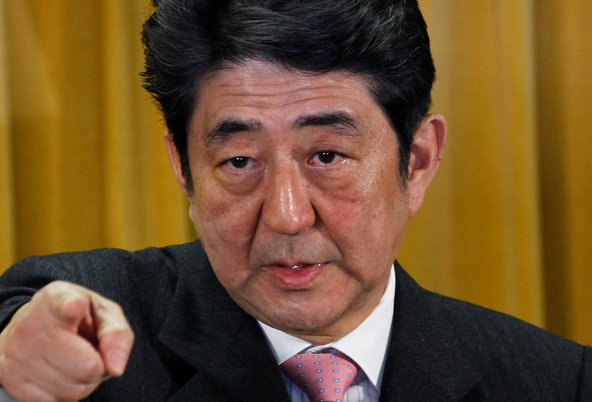
New (/old) Prime Minister of Japan, Shinzo Abe. After serving in the same post in 2006-7, Abe returns in late Dec. 2012 amid frustration with Japan’s stagnant economy and uncertainty over future reliance on nuclear power. Photo: Koji Sasahara/Associated Press
On the heels of South Korea‘s recent election, Japan has chosen new leadership as well. Well, not completely new. Shinzo Abe–who was prime minister for a brief term in 2006-7–of the Liberal Democratic Party will lead what he termed “a crisis breakthrough cabinet.”
Described and right-wing, nationalist, hawkish, and outspoken, Abe has vowed to shore up the economy, deal with a swelling national debt and come up with a fresh recovery plan to address the damage caused by last year’s tsunami and subsequent nuclear power plant scare.
Japan relies heavily on nuclear power, which supplies 1/3 of its energy needs. After the Fukushima meltdown last year the government closed all of Japan’s nuclear plants, and established a plan to completely cease using nuclear power in 30 years. Cutting off domestic energy production hit the economy hard- energy costs skyrocketed and Japan was forced to increase imports of oil and natural gas, which greatly increased its trade deficit. Abe’s government has indicated it will look at plans for reinstating nuclear power to help with economic recovery.
Abe also wants to encourage investment and broaden Japan’s global economic presence, which will hopefully lead to inflation needed to boost the economy. He is in favor of raising Japan’s military stature as well as its partnership with U.S. on security and defense matters. Locally, Abe has rankled China and South Korea on several occasions with nationalist statements and policies some see as insensitive and provocative.
As with South Korea, Japan’s election came down the wire, indicating a public divided on the direction of the country and who best to lead it. This will create challenges for Abe to gain support for his policies; a sizable bloc of opposition party members remains in parliament.
Europe, Asia, and the U.S. are still searching for effective solutions to the economic crisis; it is unclear whether Abe’s program will make a difference. Handling the nuclear power question is also tricky- while understandably skittish after the disaster, it was such a big part of Japan’s economy that removing nuclear power might cause more harm than good.
South Korea and Japan are critical to the prosperity and stability of Asia, and both are undergoing significant political changes at the same time. The economies in both countries are in fragile states; previous attempts to fix the situation have not worked. New ideas could help, and democratic choice of government allows new ideas to come to light.